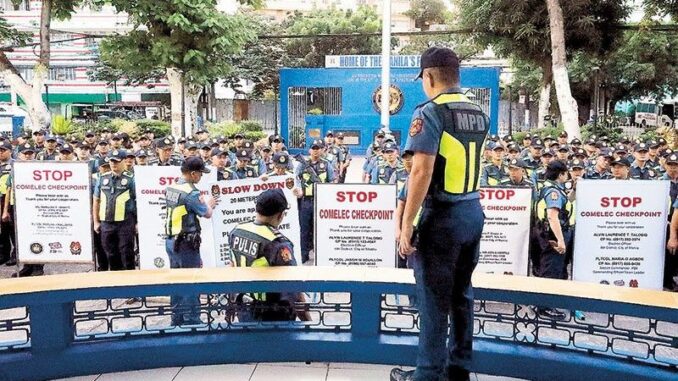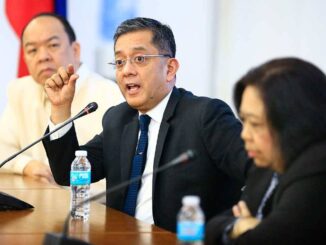
MANILA, Philippines — A nationwide ban takes effect today on the carrying of firearms and on the transfer, reassignment or suspension of state workers and officials, as the country officially enters the election period in the run-up to the May 11 elections, the Commission on Elections (Comelec) said yesterday.
Under the Omnibus Election Code, the election period shall commence 90 days before the day of the election and shall end 30 days after, or on June 11.
“We will now be inside the election period as well as the gun ban period. We are, therefore, reminding everyone to especially be careful in carrying deadly weapons outside of their residences,” Comelec Chairman George Garcia said in an interview.
During this period, it is prohibited to carry or transport firearms or other deadly weapons, unless authorized in writing by the Comelec.
It is also prohibited for candidates to use security personnel or bodyguards unless authorized also in writing by the Commission.
The Comelec likewise said organization, deployment and maintenance of reaction forces, strike forces or similar entities are also banned.
Also prohibited is the transfer or reassignment of officers and employees in the civil service, except upon prior approval of the Comelec.
Suspension of elective provincial, city, municipal or barangay officer without prior approval of the Comelec is also prohibited starting today.
The Comelec stressed that violation of the prohibited acts is considered election offense, with sanctions ranging from imprisonment of one to six years, to disqualification from public office and removal of the right to vote.
Body cams
As security measures are tightened across the country, Philippine National Police chief Gen. Rommel Francisco Marbil said police officers manning checkpoints beginning today would be equipped with body-worn cameras and other alternative recording devices.
He said the measure is necessary to ensure that civilians are protected and unscrupulous members of the PNP are prevented from committing abuses or other illegal acts.
With body cameras, Marbil said police officers are expected to strictly follow the so-called plain view doctrine, which allows law enforcement authorities to take any evidence of a crime or contraband found in plain sight.
“We will abide by the law on human rights. That’s what we want, so there’s nothing to worry about,” he said.
Security checkpoints, which are under the jurisdiction of the Comelec, would also be positioned in well-lit areas, Marbil said.
He also ordered police officers to set up their checkpoints in areas with CCTV cameras.
The National Capital Region Police Office (NCRPO), meanwhile, said police officers will not hesitate to arrest gun ban violators.
“The NCRPO will execute the election gun ban with the highest level of discipline, respect for human rights and zero tolerance for violations,” Metro Manila police chief Brig. Gen. Anthony Aberin said in a statement.
He reminded the public that only law enforcement personnel in complete uniform and on official duty are authorized to carry firearms during the election season.
Civilians and private entities seeking exemptions must secure a certificate of authority from the Comelec, he stressed.
No ‘palakasan’
In a statement, Manila Mayor Honey Lacuna-Pangan appealed to law enforcers and security forces to avoid palakasan or giving undue favor to some individuals in the enforcement of the gun ban.
She also called on them to follow the law on search, seizure and warrantless arrests.
The mayor called on the Manila Police District to follow standards set by the PNP and the Commission on Human Rights in establishing police checkpoints for the enforcement of the gun ban.
The mayor also advised motorists to use cameras on dashboards of their vehicles or on their helmets, which they could use as “protection against scalawags.”
In addition, the mayor ordered officials of barangays and Sangguniang Kabataan in the city to ensure all their CCTV cameras are working.
MPD Director Brig. Gen. Arnold Thomas has appealed for understanding from motorists as checkpoints would likely cause traffic congestion.
Meanwhile, an official of the Department of Migrant Workers (DMW) has appealed to the Comelec to allow the conduct of job fairs during the election period.
Cesar Chavez, DMW Taipei Migrant Workers Office director for migrant workers services and labor attaché, said they hope the Comelec would act favorably on their request so that they can expedite the hiring of Filipinos for job vacancies in Taiwan.
“Many are requesting for Comelec exemption because we know Jan.12 is already election period,” he said at a news forum at the Dapo Restaurant and Bar in Quezon City.
The official was referring to local government units that want job fairs to be held in their areas.
Chavez said there are about 3,000 job orders in Taiwan that need to be filled, mostly related to semiconductor and artificial intelligence industries.
He said nearly 2,000 people were hired in job fairs held in Cabanatuan City, Nueva Ecija, San Jose del Monte City in Bulacan and Quezon City.
Instead of the traditional way of getting hired through accredited recruitment agencies, Chavez said job fairs are better as there are other government agencies present where applicants can process their requirements.
Chavez said an entry level worker in Taiwan can earn about NT$28,590 or P52,000 a month. The monthly salary could go as high as P80,000 for workers who will render overtime hours.
Should the Comelec grant exemption, Chavez said the poll body will also include restrictions to prevent politicians from taking advantage of the job fairs for their personal gain. — Emmanuel Tupas, Ghio Ong





Be the first to comment